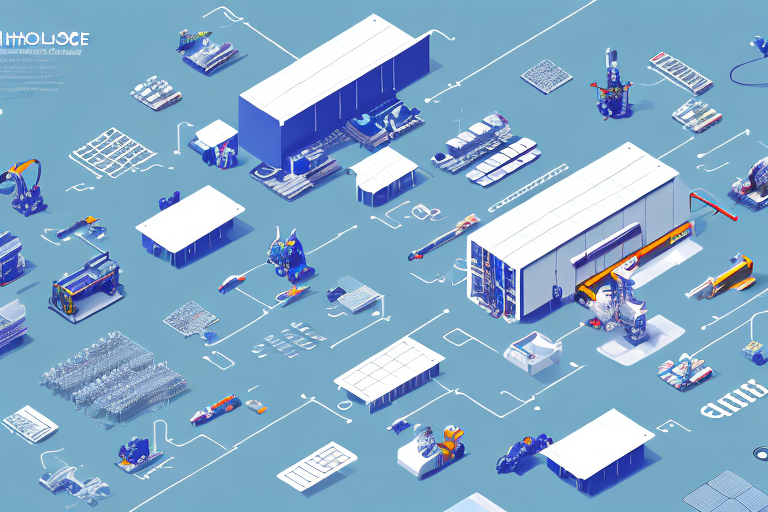Exploring Logistic Innovations: How Technology is Revolutionizing the Logistics Industry
Logistics is a critical component of business operations, continuously evolving to meet the demands of a dynamic market. Recent advancements in technology have revolutionized logistics and supply chain management, optimizing processes and enhancing operational efficiency. This article delves into some of the latest innovations in logistic technologies and their profound impact on the industry.
Automation and Artificial Intelligence in Logistics
The Impact of Automation on Logistics Operations
Automation is reshaping logistics operations, encompassing automated warehouses, sorting systems, and delivery vehicles. Automated systems enhance task speed and accuracy, leading to quicker delivery times, reduced operational costs, and heightened efficiency. Furthermore, these systems operate 24/7, ensuring continuous service availability for customers.
According to a McKinsey report, automation can increase productivity in logistics by up to 30%. However, businesses face challenges such as high initial implementation costs and the need for skilled technical personnel for system maintenance and upgrades. Additionally, automation may lead to workforce displacement, necessitating strategic workforce planning.
Despite these challenges, the integration of automation offers significant benefits, such as improved inventory management, reduced waste, and enhanced supply chain visibility. Automated systems also minimize the risk of human error, which can result in costly delays and inaccuracies. Companies investing in automation are likely to experience substantial operational improvements, along with increased customer satisfaction and loyalty.
The Role of Artificial Intelligence in Logistics Optimization
Artificial Intelligence (AI) is increasingly influential in logistics, leveraging machine learning algorithms to optimize various operations. AI-powered systems can analyze vast datasets to make real-time decisions that enhance supply chain efficiency.
For example, AI-driven transportation systems can optimize delivery routes by factoring in real-time traffic data, weather conditions, and other variables, leading to reduced fuel consumption and lower operational costs. In warehouse management, AI robots can automate repetitive tasks such as picking and packing, thereby increasing productivity and allowing human workers to focus on more complex responsibilities.
Moreover, AI enhances supply chain visibility through real-time shipment tracking and monitoring, enabling proactive identification and resolution of potential issues. AI analytics also provide insights into customer behavior and preferences, allowing logistics companies to tailor their services to meet specific needs and improve customer satisfaction.
Data-Driven Logistics Management
Big Data Analytics: A Game Changer for Logistics Management
The integration of Big Data analytics into logistics management has become indispensable, offering valuable insights into operational performance. By analyzing data related to delivery times, transportation routes, and vehicle utilization, businesses can optimize processes, reduce costs, and enhance customer satisfaction.
One key advantage is the ability to predict demand and adjust inventory levels accordingly. By examining historical data on customer orders and market trends, businesses can forecast future demand, mitigating the risk of stockouts or overstocking. This optimization not only reduces costs but also ensures that customer needs are consistently met.
Furthermore, Big Data analytics improve supply chain visibility and collaboration by enabling data sharing among suppliers, logistics providers, and other stakeholders. This comprehensive visibility facilitates the identification of inefficiencies and areas for improvement, leading to reduced lead times and improved on-time delivery rates.
Predictive Analytics and Machine Learning for Resilient Supply Chains
Predictive analytics and machine learning are pivotal in building resilient supply chains. These technologies allow businesses to anticipate and mitigate potential disruptions, ensuring a more agile and responsive logistics system.
Predictive analytics can forecast inventory demand, allowing for optimized supply chain operations that prevent stockouts or excess inventory. Machine learning algorithms analyze historical data to identify patterns and predict future events, enabling proactive management of potential disruptions such as supply delays or demand surges.
By leveraging these technologies, logistics companies can enhance their ability to respond swiftly to unforeseen events, maintaining continuity and minimizing the impact of disruptions on operations.
Emerging Technologies in Logistics
The Rise of Autonomous Vehicles in Logistics Transportation
Autonomous vehicles are emerging as a transformative technology in the logistics sector. Companies are investing in self-driving cars, trucks, and drones to lower costs, improve safety, and boost operational efficiency. Autonomous delivery solutions are particularly effective for last-mile deliveries, offering the potential for future application in long-haul transportation as well.
However, the implementation of autonomous vehicles requires significant investment in research and development, hardware, and software. Additionally, comprehensive legal and regulatory frameworks must be established to ensure the safe and ethical use of these vehicles.
While autonomous vehicles promise substantial benefits, there are concerns regarding their impact on employment within the logistics industry. As automation increases, the demand for certain job roles may decline, necessitating workforce retraining and strategic planning to address potential job displacement.
Blockchain Technology in Logistics
Blockchain technology is gaining traction in the logistics industry due to its ability to facilitate secure data sharing, enhance transparency, and reduce fraud. By utilizing encrypted, decentralized ledgers, blockchain can create a more efficient and secure logistics ecosystem.
Implementing blockchain in logistics presents challenges, including the need for substantial investment in infrastructure and technical expertise. Additionally, achieving widespread acceptance across all industry stakeholders is essential for the effective deployment of blockchain solutions.
Despite these challenges, blockchain offers significant advantages such as real-time tracking of goods from origin to destination, improved inventory management, and enhanced customer satisfaction. Blockchain also streamlines payment processing, reducing the need for intermediaries and lowering transaction costs.
IoT and Cloud Computing in Logistics
Enhancing Supply Chain Visibility through IoT-based Solutions
The Internet of Things (IoT) has introduced unprecedented levels of visibility and connectivity into logistics operations. IoT-based solutions enable real-time data collection on shipments, vehicles, and inventory, facilitating more precise tracking and efficient management.
IoT sensors can monitor variables such as temperature, pressure, and humidity during transit, ensuring that sensitive goods are handled appropriately. This enhanced visibility fosters transparency and trust within the supply chain, allowing businesses and customers to monitor shipments in real time and respond promptly to any issues.
Leveraging Cloud Computing for Efficient and Scalable Logistics Operations
Cloud computing has revolutionized data storage, access, and utilization in logistics. By leveraging cloud platforms, businesses can scale their operations efficiently and adopt pay-as-you-go models, reducing the need for significant upfront investments in IT infrastructure.
Cloud computing enables seamless access to large volumes of data, facilitating advanced analytics and the implementation of AI-driven solutions. However, adopting cloud technologies requires expertise and investment, as well as robust cybersecurity measures to protect sensitive business data.
Sustainable and Resilient Supply Chains
Addressing Environmental Concerns with Sustainable Logistics Practices
Environmental sustainability has become a critical focus in logistics operations. Companies are adopting sustainable practices such as route optimization, the use of fuel-efficient vehicles, and the implementation of renewable energy sources to reduce carbon emissions and environmental impact.
Sustainable logistics practices not only contribute to environmental conservation but also offer economic benefits, including cost savings through reduced fuel consumption and enhanced corporate reputation. Incorporating sustainability into logistics requires both investment and a shift in organizational mindset, but the long-term benefits are substantial.
Building Resilient Supply Chains with Predictive Analytics and Machine Learning
Resilient supply chains are essential for maintaining operational continuity in the face of disruptions. Predictive analytics and machine learning play vital roles in enhancing supply chain resilience by forecasting potential disruptions and enabling proactive mitigation strategies.
These technologies analyze historical and real-time data to identify patterns and predict future events, allowing businesses to anticipate challenges and adjust their supply chain strategies accordingly. By building resilience through advanced analytics, logistics companies can better navigate uncertainties and maintain efficient operations.
Customer Experience and Industry Collaboration
Innovations Boosting Customer Experience in Logistic Services
The rise of e-commerce has elevated customer expectations regarding logistics services. To meet these demands, businesses are implementing technologies such as real-time tracking, customized delivery options, and seamless return processes to enhance the customer experience.
Offering exceptional customer experiences not only increases customer loyalty but also differentiates businesses from their competitors. Technology-driven innovations enable logistics companies to provide timely and reliable services that align with modern customer preferences.
Collaboration among Industry Players
Collaboration among industry stakeholders is crucial for maximizing the potential of logistic innovations. By partnering and sharing knowledge, resources, and expertise, businesses can address common challenges and accelerate the adoption of new technologies.
Collaborative initiatives may include setting industry standards for emerging technologies, forming consortiums to develop secure digital infrastructures, and engaging in joint ventures to explore innovative solutions such as autonomous vehicles. Such collaborations drive collective progress and foster a more integrated and efficient logistics ecosystem.
Conclusion
Technological innovations are revolutionizing the logistics industry, offering opportunities to enhance efficiency, reduce costs, and improve customer satisfaction. By embracing advancements in automation, AI, Big Data, IoT, blockchain, and sustainable practices, logistics companies can navigate the complexities of modern supply chains and achieve competitive advantages.
However, the adoption of these technologies also brings challenges, including significant investments, the need for skilled personnel, and cybersecurity concerns. Successful integration of technological innovations requires strategic planning, robust infrastructure, and collaborative efforts across the industry.
As the logistics landscape continues to evolve, companies that effectively leverage technology and foster industry partnerships will be well-positioned to thrive in a dynamic and competitive market.




















